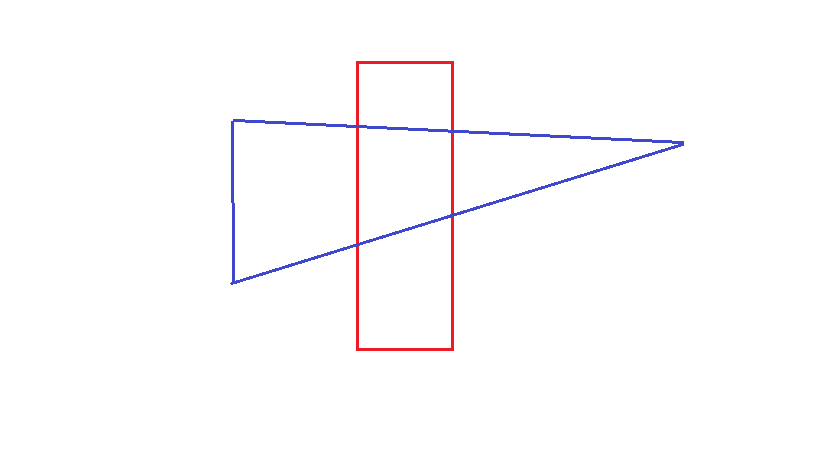题意:
给出n个红点,m个蓝点。问是否存在一条直线使得红点和蓝点分别分布在直线的两侧,这些点不能再直线上。
分析:
求出两种点的凸包,如果两个凸包相离的话,则存在这样一条直线。
判断凸包相离需要判断这两件事情:
- 任何一个凸包的任何一个顶点不能在另一个凸包的内部或者边界上。
- 两个凸包的任意两边不能相交。
二者缺一不可,第一条很好理解,但为什么还要判断第二条,因为存在这种情况:

虽然每个凸包的顶点都在另一个凸包的外部,但两个凸包明显是相交的。

1 //#define LOCAL 2 #include <cstdio> 3 #include <cstring> 4 #include <algorithm> 5 #include <cmath> 6 #include <vector> 7 using namespace std; 8 9 const int maxn = 500 + 10; 10 const double eps = 1e-10; 11 const double PI = acos(-1.0); 12 13 int dcmp(double x) 14 { 15 if(fabs(x) < eps) return 0; 16 else return x < 0 ? -1 : 1; 17 } 18 19 struct Point 20 { 21 double x, y; 22 Point(double x=0, double y=0):x(x), y(y) {} 23 }; 24 typedef Point Vector; 25 Point operator + (Point a, Point b) { return Point(a.x+b.x, a.y+b.y); } 26 Point operator - (Point a, Point b) { return Point(a.x-b.x, a.y-b.y); } 27 Point operator * (Point a, double p) { return Point(a.x*p, a.y*p); } 28 Point operator / (Point a, double p) { return Point(a.x/p, a.y/p); } 29 bool operator < (Point a, Point b) { return a.x < b.x || (a.x == b.x && a.y < b.y); } 30 bool operator == (Point a, Point b) { return a.x == b.x && a.y == b.y; } 31 32 double Dot(Vector A, Vector B) { return A.x*B.x + A.y*B.y; } 33 double Cross(Vector A, Vector B) { return A.x*B.y - A.y*B.x; } 34 35 bool SegmentIntersection(Point a1, Point a2, Point b1, Point b2) 36 { 37 double c1 = Cross(a2-a1, b1-a1), c2 = Cross(a2-a1, b2-a1); 38 double c3 = Cross(b2-b1, a1-b1), c4 = Cross(b2-b1, a2-b1); 39 return dcmp(c1*c2) < 0 && dcmp(c3*c4) < 0; 40 } 41 42 bool OnSegment(Point p, Point a, Point b) 43 {//点是否在线段上,不包含在端点处的情况 44 return dcmp(Cross(a-p, b-p)) == 0 && dcmp(Dot(a-p, b-p)) < 0; 45 } 46 47 vector<Point> ConvexHull(vector<Point> p) 48 { 49 sort(p.begin(), p.end()); 50 p.erase(unique(p.begin(), p.end()), p.end()); 51 52 int n = p.size(); 53 int m = 0; 54 vector<Point> ch(n+1); 55 for(int i = 0; i < n; ++i) 56 { 57 while(m > 1 && Cross(ch[m-1]-ch[m-2], p[i]-ch[m-2]) <= 0) m--; 58 ch[m++] = p[i]; 59 } 60 int k = m; 61 for(int i = n-2; i >= 0; --i) 62 { 63 while(m > k && Cross(ch[m-1]-ch[m-2], p[i]-ch[m-2]) <= 0) m--; 64 ch[m++] = p[i]; 65 } 66 if(m > 1) m--; 67 ch.resize(m); 68 return ch; 69 } 70 71 int IsPointInPolygon(Point p, const vector<Point>& poly) 72 { 73 int wn = 0; 74 int n = poly.size(); 75 for(int i = 0; i < n; ++i) 76 { 77 if(OnSegment(p, poly[i], poly[(i+1)%n])) return -1; //边界 78 int k = dcmp(Cross(poly[(i+1)%n]-poly[i], p-poly[i])); 79 int d1 = dcmp(poly[i].y-p.y); 80 int d2 = dcmp(poly[(i+1)%n].y-p.y); 81 if(k > 0 && d1 <= 0 && d2 > 0) wn++; 82 if(k < 0 && d2 <= 0 && d1 > 0) wn--; 83 } 84 if(wn) return 1; //内部 85 return 0; //外部 86 } 87 88 bool ConvexPolygonDisjiont(const vector<Point> ch1, const vector<Point> ch2) 89 { 90 int c1 = ch1.size(), c2 = ch2.size(); 91 for(int i = 0; i < c1; ++i) 92 if(IsPointInPolygon(ch1[i], ch2) != 0) return false; 93 for(int i = 0; i < c2; ++i) 94 if(IsPointInPolygon(ch2[i], ch1) != 0) return false; 95 for(int i = 0; i < c1; ++i) 96 for(int j = 0; j < c2; ++j) 97 if(SegmentIntersection(ch1[i], ch1[(i+1)%c1], ch2[j], ch2[(j+1)%c2])) return false; 98 return true; 99 } 100 101 int main(void) 102 { 103 #ifdef LOCAL 104 freopen("10256in.txt", "r", stdin); 105 #endif 106 107 int n, m; 108 while(scanf("%d%d", &n, &m) == 2) 109 { 110 if(!n && !m) break; 111 vector<Point> p1, p2; 112 double x, y; 113 for(int i = 0; i < n; ++i) 114 { 115 scanf("%lf%lf", &x, &y); 116 p1.push_back(Point(x, y)); 117 } 118 for(int i = 0; i < m; ++i) 119 { 120 scanf("%lf%lf", &x, &y); 121 p2.push_back(Point(x, y)); 122 } 123 if(ConvexPolygonDisjiont(ConvexHull(p1), ConvexHull(p2))) puts("Yes"); 124 else puts("No"); 125 } 126 127 return 0; 128 }
